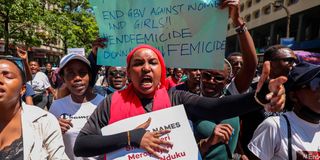From flawed rape laws to conflict zones: Why justice remains elusive for survivors

Protesters march on the streets of Nairobi against increasing violence against women in the country on December 10, 2024. April marks Sexual Assault Awareness Month, a time for confronting uncomfortable truths about how our societies and legal frameworks continue to fail survivors.
What you need to know:
- Rape laws in many countries remain inadequate, forcing survivors into silence and re-victimising them when they seek justice.
- Sexual violence increases dramatically during conflicts and crises, with perpetrators rarely held accountable for their crimes.
- While legal reform is a crucial first step, ending sexual violence requires comprehensive approaches.
When 19-year-old Amina (not her real name) finally gathered the courage to report her assault, she was met with an unexpected question: "Did you fight back? Where are your injuries?" This is the reality for countless survivors of sexual violence across the globe—their trauma compounded by systems designed to doubt rather than protect them.
April marks Sexual Assault Awareness Month, a time not just for solidarity but for confronting uncomfortable truths about how our societies and legal frameworks continue to fail survivors. It's a moment to listen to and honour those in our communities who have experienced sexual violence and to show them they aren't alone in their journey.
According to Equality Now, an organisation that advocates for the human rights of women and girls worldwide by raising international visibility of individual cases of abuse, there are five critical aspects of sexual violence that demand our urgent attention.
Rape laws remain fundamentally flawed
In numerous countries, rape laws continue to be defined not by the absence of consent but by the presence of physical force, threats, or resistance. This narrow framework excludes many violations, particularly those involving coercion, power imbalances, or vulnerability.
The burden of proof often falls heavily on survivors, who must demonstrate that they physically resisted their attackers—a standard that not only traumatises victims further but also emboldens perpetrators.
Across Africa, the situation is particularly alarming. A recent analysis by Equality Now revealed that 25 countries have definitions of rape that are either incomplete or non-compliant with international and regional standards. Many jurisdictions still fail to criminalise marital rape or recognise non-vaginal penetration as rape, leaving significant protection gaps.
A culture of silence persists
"I knew if I spoke up, my family would suffer more than he ever would," shares a survivor from who chooses to remain anonymous. This sentiment echoes across communities worldwide.
Social stigma, fear of retaliation, and deeply entrenched patriarchal norms force many survivors into silence. Those who do come forward often face disbelief, victim-blaming, or complete inaction from authorities.
The barriers are even more significant for vulnerable populations. Studies show that between 40 and 68 per cent of people with disabilities experience sexual violence before turning 18, yet they face additional hurdles in accessing justice.
In South Asia, survivors have reported that bribery, procedural delays, and pressure to accept extra-legal settlements are common occurrences, leading many to abandon their pursuit of justice entirely.
Justice systems often re-victimise survivors
The path to justice frequently inflicts new wounds on those already traumatised. From invasive medical examinations such as the discredited "two-finger test" to courtroom procedures that permit scrutiny of a survivor's sexual history, legal systems routinely re-traumatise those seeking accountability.
A newly released report by the Clooney Foundation for Justice's Trial Watch initiative highlights a troubling trend in Kenya. Despite the country's Prohibition of Female Genital Mutilation (PFGM) Act of 2011, authorities have reportedly used this legislation to disproportionately punish victims of FGM rather than perpetrators.
"Kenyan authorities have turned the law against the very people it is designed to protect," states the report, prepared in partnership with the American Bar Association Centre for Human Rights (ABA CHR).
The findings, based on in-person trial monitoring and a review of 68 FGM cases across Kenya, revealed that over 55 per cent of defendants were women and minor girls who were themselves victims of FGM. In stark contrast, only six per cent of those prosecuted were "cutters"—individuals who perform FGM—and 16 per cent were owners of premises where the procedures occurred.
Even more disturbing, the report identified 44 FGM victims, including seven minor girls, who were convicted for their own FGM.
Conflict and crisis amplify vulnerability
"During war, women's bodies become battlegrounds," explains a humanitarian worker. Sexual violence escalates dramatically during conflicts, crises, and displacement—precisely when protection mechanisms and justice systems often collapse.
In Ethiopia, Sudan, and the Democratic Republic of the Congo, sexual violence has been deployed systematically as a weapon of war. Yet investigations and prosecutions of these crimes remain exceptionally rare.
The threat of violence has profound ripple effects. Many girls abandon their education out of fear, becoming confined to their homes and burdened with increased household and caregiving responsibilities. Survivors frequently suffer debilitating physical injuries and face rejection from their communities and families.
Legal reform is just the beginning
While legislative reform represents a critical first step, ending sexual violence demands a comprehensive approach. Effective implementation of laws, adequate resources, specialised training for authorities, robust survivor support systems, and unwavering political will are all essential components.
Governments must align their national legislation with international human rights standards, eliminate discriminatory provisions, and develop survivor-centred systems that prioritise healing and justice.





